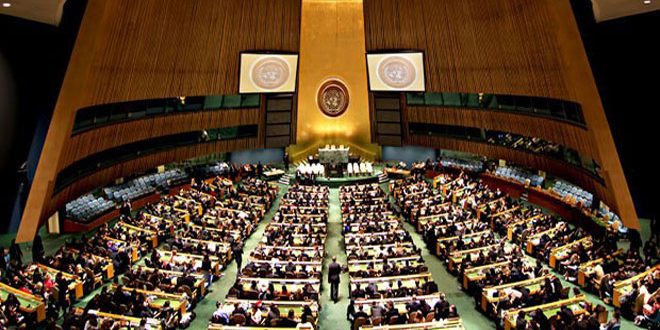NEW YORK– Member of the Syrian permanent mission at the UN, advisor Omar al-Ersan, said that for the UN Counter-Terrorism Office to have true independence and effectiveness it must not be subject to political and financial pressure practiced by governments of some member countries to achieve personal interests and agendas, SANA reported.
In a speech at a UN General Assembly session on the UN’s counter-terrorism strategy, al-Ersan said that effectiveness and success in combating terrorism require political will, commitment by all member states, and refraining from breaching relevant Security Council resolutions or using terrorism as a political and military tool to interfere in states’ affairs.
He said that Syria’s delegation expresses its reservation over article 3 of resolution no.71/291 adopted by the General Assembly on June 15th because it grants the government of Saudi Arabia special privileges at the UN Counter-Terrorism Office as the contribution of Saudi Arabia to spreading terrorism by giving millions of dollars to armed terrorist groups are well known.
Al-Ersan said that donating USD 100 million to the Counter-Terrorism Office or buying weapons worth more than USD 500 million do not absolve Saudi Arabia of its support for terrorism, stressing the need for transparency in implementing the UN’s counter-terrorism strategy.
He pointed out that Syria’s experience with terrorists during the past seven years causes it to believe that the main responsibility for the failure of the international community in fighting terrorism is due to certain member states’ lack of commitment to implementing the global counter-terrorism strategy, their breaches of relevant Security Council resolutions, and the laxness in holding these terrorism-sponsoring states responsible.
The Advisor cited the example of “religious” centers around the world that are funded by Saudi Arabia and Qatar with millions of dollars with the purpose of spreading the extremist Wahabi mentality, as these centers are involved in recruiting thousands of youths and sending them to fight within the ranks of ISIS, al-Nusra, and other terror groups.
He noted that since the beginning of the crisis, Syria has informed the Security Council about the flow of foreign fighters to Syria from neighboring countries, particularly Turkey, providing evidence to this, but it took the international community three years to realize the danger of this phenomenon, yet some today still deal with this issue with a narrow view limited to the threat these fighters pose if they return to their countries of origin.
Al-Ersan said that the states that sponsored terrorists in Syria are indifferent to the lives of Syrians, but they consider the return of the terrorists they sponsored to Europe a red line, adding that unfortunately, those who pay the price for such policies are innocent people in London, Manchester, Brussels, Paris, Nice, New York, and Boston, yet certain governments lack the courage to admit the error of their policies of being lenient with terrorism in Syria and Iraq and of allying themselves with the extremist and terrorist governments of Saudi Arabia, Qatar, and Turkey.
He said that the amount of funding and resources the terrorist organizations possess necessitates demands for certain states to cut off the sources of funding for terror organizations either directly or directly via involvement in banking transactions and illicit trade deals in oil, gas, and archeological artifacts with groups like ISIS and al-Nusra.
Al-Ersan said that the Syrian mission at the UN supported the recommendations of the UN Secretary-General on enhancing the UN’s capability of fighting terrorism which is the number one threat to international peace and security.
He also said that that appointing Vladimir Ivanovich Voronkov as Under-Secretary-General of the newly created United Nations Counter-Terrorism Office is an important step towards implementing the UN’s counter-terrorism strategy.

